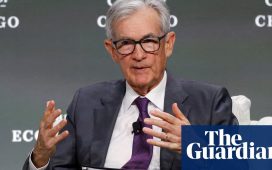Bank of England interest rate decision nears
Excitement is building in the City as the clock ticks towards noon, when the Bank of England will set UK interest rates.
As flagged in the introduction, the Bank is expected to leave UK interest rates unchanged at 5.25% today, their highest level since 2008.
But there’s a lot of interest in how soon the BoE will start cutting rates, given the falls in inflation in the last year and concerns that UK could drop into recession.
Mike Riddell, Head of Macro Unconstrained at Allianz Global Investors, predicts that the Bank will start to cut interest rates by the summer. But, he warns, “the water is getting muddier”.
Riddell says:
Only a month ago, markets were convinced that the Bank of England would begin a rate cutting cycle in March, as the UK economy had stagnated and inflation was rapidly dropping.
The next move in UK interest rates will almost certainly be down, but the timing has become more uncertain. The UK economy, and indeed much of the rest of Europe, has been showing some signs of life again. Businesses and consumers are saying they’re more confident about the outlook. The UK housing market is also picking up, perhaps buoyed by a fall in mortgage rates. It seems likely that the Bank of England will revise its growth forecast for this year higher as a result.
Inflation optimism has faded a little too. The BoE will be relieved to see that the UK labour market has cooled further, but the reality is that wage growth remains elevated and at a level that is inflationary. Inflation itself is still running way too hot, and on some measures, surprisingly ticked higher in January. The recent escalation in the Middle East puts further upside risk to inflation.
Key events
Deutsche Bank’s basecase scenario is that all nine Bank of England policymakers vote to leave interest rates on hold.
But it’s not guaranteed – some may vote for a rise.
Sanjay Raja, their chief UK economist, writes:
Our basecase is for a 9-0 vote, but there are risks on either side. Should one – or even two — members of the hawkish MPC contingent (Greene, Haskel, Mann) opt for a further Bank Rate hike, we’d see that as relatively hawkish.
Bank of England announcement will be made at noon today. Markets are expecting No Change to interest rates.
First rate cut is priced in for June.
Markets are expecting policy to ease by just over 100bps by end year. pic.twitter.com/smBWThFPRq— Jumana Saleheen (@JumanaSaleheen) February 1, 2024
Allan Monks, a UK economist for JP Morgan, said it is widely expected that rates will be kept the same on Thursday, but that the Bank will “almost certainly make a dovish pivot that puts future easing higher up on the agenda than before”.
Monks adds:
“The Bank of England’s updated narrative is likely to be that clear progress is being made on inflation, but that it is too early to declare victory and therefore caution must be exercised when thinking about when and how quickly policy can be normalised.
Bank of England interest rate decision nears
Excitement is building in the City as the clock ticks towards noon, when the Bank of England will set UK interest rates.
As flagged in the introduction, the Bank is expected to leave UK interest rates unchanged at 5.25% today, their highest level since 2008.
But there’s a lot of interest in how soon the BoE will start cutting rates, given the falls in inflation in the last year and concerns that UK could drop into recession.
Mike Riddell, Head of Macro Unconstrained at Allianz Global Investors, predicts that the Bank will start to cut interest rates by the summer. But, he warns, “the water is getting muddier”.
Riddell says:
Only a month ago, markets were convinced that the Bank of England would begin a rate cutting cycle in March, as the UK economy had stagnated and inflation was rapidly dropping.
The next move in UK interest rates will almost certainly be down, but the timing has become more uncertain. The UK economy, and indeed much of the rest of Europe, has been showing some signs of life again. Businesses and consumers are saying they’re more confident about the outlook. The UK housing market is also picking up, perhaps buoyed by a fall in mortgage rates. It seems likely that the Bank of England will revise its growth forecast for this year higher as a result.
Inflation optimism has faded a little too. The BoE will be relieved to see that the UK labour market has cooled further, but the reality is that wage growth remains elevated and at a level that is inflationary. Inflation itself is still running way too hot, and on some measures, surprisingly ticked higher in January. The recent escalation in the Middle East puts further upside risk to inflation.
Price rises have helped communications group BT to grow its revenues and profits.
BT has reported that revenues grew 3% in the last nine months, due to price increases and the rollout of faster, “fibre to the premises” broadband.
Average revenue per user at its Openreach division grew by 10% year-on-year, “due to price rises and increased volumes of FTTP’.
BT’s pretax profits jumped 15% to almost £1.5bn.
Last summer, the Guardian reported that the UK’s largest mobile and broadband companies were pushing through the biggest round of price hikes for more than 30 years, sparking accusations of “greedflation”.
Rachel Reeves then told UK business chiefs that Labour’s pledge to cap corporation tax at 25% will give them confidence to invest.
She says”:
“That means businesses can plan investment projects today, with the confidence of knowing how their returns will be taxed for the rest of this decade.
“To those you in this room who might be wondering – do we really mean what we say? Has Labour really changed? Will warm words today be matched by action in government?
“Be in no doubt. We will campaign as a pro-business party – and we will govern as a pro-business party.”
Labour pledges to cap corporation tax at 25%
Newsflash: shadow chancellor Rachel Reeves has pledged that Labour will not raise corporation tax if it wins the next election.
Speaking at Labour’s Annual Business Conference this morning, Reeves says that the next Labour government will cap the headlin rate of corporation tax at 25% for the duration of the next parliament.
And, if competiveness comes under threat, Labour “will act”, she says – an indication that it could be cut.
Reeves says:
“We reject the calls from those on the right wing of the Conservative Party to cut corporation tax. Our current rate is the lowest in the G7.
“We believe that 25 per cent rate strikes the correct balance between the needs of our public finances, and the demands of a competitive global economy.
“The next Labour government will make the pro-business choice and the pro-growth choice: We will cap the headline rate of corporation tax at its current rate of 25 per cent for the next parliament. And should our competitiveness come under threat, if necessary we will act.
Our Politics Live blog has more details:
Corporation tax was raised from 19% to 25% last April, after chancellor Jeremy Hunt reversed a plan by his predecessor, Kwasi Kwarteng, to keep it at 19%.
New: Labour promising to keep corporation tax at 25pc for next Parliament and may lower if uk competitiveness comes under threat – @RachelReevesMP at Labour business conference. @BloombergUK
— Katherine Griffiths (@GriffithsKath_) February 1, 2024
Euroclear earns €4.4bn interest from frozen Russian assets
Belgium-based financial services company Euroclear earned €4.4bn last year from Russian assets it is currrently holding which were frozen after the Ukraine war.
In its annual results this morning, Euroclear says it made €5.5bn of net interest earnings in 2023, of which €4.4bn relate to interests linked to Russian sanctions.
Subject to Belgian corporate tax, these earnings will generate over €1bn for the Belgian State in 2023.
Western sanctions means Euroclear is unable to pass on coupon payments and redemptions to sanctioned entities, so cash is stacking up on its balance sheet – which had swelled by €38bn by the end of 2023 to €162bn.
Euroclear says it incurred €62m of direct costs related to Russian assets, on top of €24m of lost business from sanctioned clients.
Across the world, there are over $300bn of frozen Russian assets. In December, the US proposed that working groups from the G7 explore ways to seize this money, and use it to fund the reconstruction of Ukraine.
UK foreign secretary David Cameroon ramped up the pressure at Davos last month, saying there was a “moral, political, legal, and economic case for using the money to repair Ukraine’s war damage.
Euroclear says it will retain profits on Russian assets until it is provided with further guidance on the distribution or management of such profits.
It says:
2023 also saw various parties contest the consequences of the application of sanctions, with a significant number of legal proceedings ongoing, almost exclusively in Russian courts. Claimants have initiated legal proceeding aiming mainly to access the assets blocked in Euroclear’s books. Despite all legal actions taken by Euroclear and the considerable resources mobilised, the probability of unfavourable rulings in Russian courts is high since Russia does not recognise the international sanctions. Euroclear will continue to defend itself against all legal claims.
In parallel, the Board notes that the European Commission is contemplating various options to use the profits generated by the reinvestment of sanctioned amounts held by financial institutions, including Euroclear, for the financing of Ukraine’s reconstruction.

Kalyeena Makortoff
Once-troubled lender TSB is proving to be a cash generator for its Spanish parent company, Sabadell.
The UK lender had at one point been put up for a potential sale after years of losses linked to a major IT meltdown in 2018, related to its separation from Lloyds Banking Group.
But TSB said on Thursday would be handing over a £120m dividend to Sabadell this spring, up from £50m in 2022, marking its second straight payout to the Spanish lender.
The payout follows its second straight year of annual profit, with pre-tax earnings rising nearly 30% to £237m.
However, the rise in profits was driven by high interest rates that allowed the lender to charge more for loans and mortgages, but which are expected to fall throughout 2024.
TSB is also expecting more customers to struggle to keep up on their repayments, resulting in a 24% jump in cash put aside for potential defaults, to £63m. The lender said it reflected “the uncertain economic outlook, the higher interest rate environment and increasing inflationary pressures on our customers.”
However, TSB’s CEO Robin Bulloch cheered the bank’s performance:
“We are reporting another year of sustained profitability, demonstrating the impact of both our continued focus on customers, delivering products and services that genuinely meet their needs, and the work to make TSB a simpler, more efficient, and resilient bank.”








